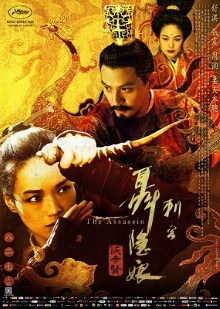
Despite a long and prolific directing career, Hou Hsiao-Hsien had never made a wuxia film before this one, which explains why its release was so highly anticipated in the Chinese-speaking world. Its English title makes it sound boringly generic but its more informative Chinese title indicates that it was adapted from an ancient story that is a classic of the genre.
Shu Qi stars as the titular character Nie Yinniang who is returned to her family after being trained as an assassin. It is the Tang Dynasty in China and there is fear of the provinces rebelling against the Emperor. Yinniang is from Weibo, the most powerful of these provinces, and her master orders her to kill its governor who also happens to be her cousin. At the same time, the governor Tian Ji’an wrestles over whether or not to preemptively strike against the Emperor before his province is swallowed up and his wife plots against the concubine he favors.
Written out like this, the story doesn’t sound too complex but gleaning it from the film feels like pulling teeth. The film has frustratingly little dialogue and what there is is mostly in classical Chinese, rendering it all but indecipherable to me without English subtitles. The characters are tied together in a complicated web of familial relationships and it is up to the audience to infer these ties through their family names and their situations as there is certainly no exposition. Our comprehension is further hindered by the stilted flow of the scenes which seem designed to try our patience. For example, one scene consists of a long-distance shot of Yinniang engaged in battle with numerous guardsmen inside the governor’s compound but we have no idea how the fight started and how it ended.
It has to be said that this sense of mystery enhances the poetic atmosphere of the film. The Assassin lives and breathes wuxia to an extent that few other works can match. The cinematography is superb and the backdrops are jaw-dropping. Watching this is enough to convince you that someone should create an award category for best location scouting just so that this can win it. The shots of rolling mist in particular had me wondering how they did it. They seem too realistic and beautiful to be CGI and yet waiting around for just the right moment to film it must have been excruciating.
As for the fight scenes, Hou seems to have chosen a more restrained style. There aren’t actually many fights in this film and those that exist tend to end quickly once Yinniang gets involved in them. That makes sense. She’s an assassin, not a warrior, so she simply darts in and out slashing the throats of severely outmatched opponents with her dagger. It’s a practical, un-flashy form of martial arts. Strangely there’s also sorcery in this film. I get that this comes straight from the original short story but it feels at odds with how relatively grounded the fighting feels.
In the end, I found The Assassin to be a sublimely beautiful, even lyrical, film but I also found it to be empty and rather soulless. I gather that we are meant to feel sympathy with the protagonist but she emotes so little and remains so distant that we never establish much of a rapport with her. Her own motivations, as well as those of her master, are shrouded in mystery and open to interpretation. As such, you can admire the pretty imagery here as much as you want, but there’s nothing that will really move you.